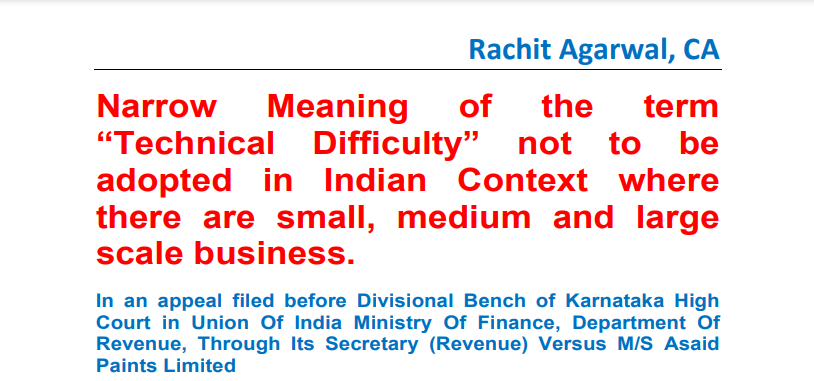Narrow Meaning of the term “Technical Difficulty” not to be adopted in the Indian context where there are small, medium, and large scale business.
In an appeal filed before Divisional Bench of Karnataka High Court in Union Of India Ministry Of Finance, Department Of Revenue, Through Its Secretary (Revenue) Versus M/S Asaid Paints Limited
1. Rule 117(1A) suffers from the vice of vagueness as to the expression “technical difficulties on the common portal” and its applicability had not been adequately defined nor its parameters asserted.
2. There was no certainty or predictability about the application of this Rule for the class of cases to which it would apply.
3. The application of the said provision would suffer from arbitrariness.
4. It was also noted that the GST Council itself had found that there can be certain errors apparent on the face of the record and that could be nontechnical in nature which would predicate leniency in the matter.
5. The Rule does not define what is a technical difficulty on the common portal. The reason for not defining the same is because the rulemaking authority was conscious of the fact that there could be a variety of technical difficulties on the common portal which could not be explained under the Rule or envisaged by the Rulemaking Authority
6. No doubt, it is the policy of the Central Government that there should be digitalization
7. But, the reality is that the Indian society is not yet so well-versed and adept at utilizing online methods, whether it is a simple transaction, or for the purpose of filings, etc
8. There are various categories such as small-scale businesses, large-scale businesses, and medium-scale industries, each one of whom may have their own challenges to meet, not only in their day-to-day carrying on of their businesses but also while complying with the requirements under the Act and the Rules
9. Since the Hon’ble Supreme Court has not interfered in the judgment in Adfert Technologies, we are persuaded to apply the same in the instant case.
10. The focus of judgments are on the consideration of vires and upholding of the same and in that context
a. Ltd. v. Union of India and Ors, [(2020) 81 GST 518 (Bombay)], (Nelco Ltd.)
b. Bombay High Court in JCB India Limited v. Union of India, (2018) 53 GSTR, 197
c. Ingersoll-Rand Technologies and Services Private Limited vs. Union of India, [(2020) 113 Taxman 187 (Allahabad)],
11. The difficulty of the assessees must be appreciated in the background of the fact that they would have to adjust, of course, as early as possible, under the umbrella of the new tax regime. But, while doing so, the glitches which have to occur either on account of the electrical devices which have to be used or on account of the man-made lapses, would have to be both taken into consideration.
12. We find that the reasoning of the learned single Judge and the relief granted would not call for any interference except to the extent of extending the time within which they would now have to file TRAN-1.
 CA Rachit Agarwal
CA Rachit Agarwal








